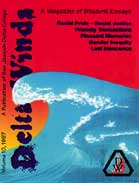Freedom at Last
 Delta Winds: A Magazine of Student Essays
Delta Winds: A Magazine of Student Essays
A Publication of San Joaquin Delta College
1997
Freedom at Last
Lin Yit
People in the United States take freedom for granted. According to the U.S. News & World Report, less than half of the voting population actually voted in this last presidential election (Leo 38). This is a clear indication that people do not value the most important freedom here in the United States and the most envied by people around the world: the right to vote. As a citizen of the United States I am constitutionally guaranteed many freedoms. Along with the right to vote, I say what I want to say and I live how I choose to live.
If the people of Cambodia had had the right to vote, the Khmer Rouge might not have taken power. During the violent Khmer Rouge victory in the civil war of Cambodia, I was forced to live a life few could imagine. My family was forced to leave our home and watch it destroyed by fire, a fire that was lit by a Khmer Rouge soldier. We could do nothing but watch it burn to the ground. "To destroy you is no loss" was the frightening slogan of the Khmer Rouge (Criddle 246). This saying accurately reflects the group's lack of concern for my family and the lives of fellow Cambodians. The slightest display of anger on our part would have resulted in our execution. We could not say a thing. It was as though my childhood was burning down along with my house, and I felt helpless at that moment. The memories of a once-beautiful homeland are now erased.
At the young age when children in the United States are beginning first grade, I was a homeless witness to a brutal genocide. I saw people getting shot in the head with chunks of their brain landing on my feet. I witnessed mass starvation. Cambodia was becoming a country of women and children. During the Khmer Rouge takeover many men were killed. After the war many husbands and fathers were killed. There was a hunt for educated men. I remember vividly the sight of a boy my age looking over the murdered corpse of his father, a puddle of blood from his head acting as a backdrop. I worried day and night about the thought of losing my father. I clung to him as though each day would be the last I would see of him. My vivid memory of Khmer Rouge police interrogating him while we were on our way to Thailand haunts me today. Thousands of Khmer Rouge soldiers spread across the country policing the people. My father was de-humanized in front of my eyes. My father was now just another in a long line of victims that my eyes have mercifully gazed upon. It seemed as though my family and my entire village were being attacked. I felt every blow with my father, not physically as he did, but emotionally. Layers of my heart are razored off with every blow. Some of the pain is still felt today.
My experiences as a child allow me to further appreciate the freedoms that I have today. Unlike so many of my fellow Cambodians I have survived what an Academy-Award-winning movie called The Killing Fields. According to Kimmo Kiljunen, "Of an estimated population of seven million people, about one million had been killed or had died of starvation, torture, or sickness during the Khmer Rouge regime" (30). More than twenty percent of the population was killed. To make an analogy with the U.S., in a population of two hundred and sixty five million people, about fifty eight million people would have perished, roughly the entire population of California and New York combined. People were killed for enjoying their freedoms.
That was my life before my freedom here in the United States. I have been without freedom for a time in my life, and today I dedicate my life to fully experiencing it. Freedom should never be taken for granted.
Works Cited
Criddle, Joan. The Odyssey of a Cambodian Family. New York: Dell, 1987.
Kiljunen, Kimmo. Decade of The Genocide. London: Zed Books Ltd., 1984.
Leo, Peter. "Beyond the Killing Fields." Sacramento Bee 9 Nov. 1990,
sec.1:1+.






